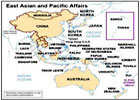
![]() Sign up for East Asian and Pacific Affairs email updates
Sign up for East Asian and Pacific Affairs email updates
 The Bureau of East Asian and Pacific Affairs, headed by Assistant Secretary Kurt M. Campbell, deals with U.S. foreign policy and U.S. relations with the countries in the Asia-Pacific region. The Bureau of East Asian and Pacific Affairs, headed by Assistant Secretary Kurt M. Campbell, deals with U.S. foreign policy and U.S. relations with the countries in the Asia-Pacific region. |
| Remarks on North Korea Assistant Secretary Campbell (Apr. 2): "We are closely in touch with China. We asked them to assist us in efforts to encourage strongly North Korea to return expeditiously do the Six-Party Talks...We were able to offer our deep sympathies and our prayers and our well wishes for the tragic sinking of the Korean warship. Obviously, the United States government has offered support. We will do everything possible operationally." Full Text |
APEC: Important for America Senior Official Tong: "[The] Asia-Pacific region is the most dynamic economic region on the planet. It accounts for more than half of the global GDP, and more than 60 percent of our exports go to the Asia-Pacific. Now within the region, APEC is the most important economic organization. It has all the key members participating, and the most important initiatives in the region take place either through APEC or are created within APEC." Full Text |
Regional Overview of East Asia and the Pacific Assistant Secretary Campbell (Mar. 3): "There should be no doubt that the United States, itself, is a Pacific nation. In every regard -- geopolitically, militarily, diplomatically, and economically -- Asia and the Pacific are indispensable to addressing the challenges and seizing the opportunities of the 21st century. As the Asia-Pacific century emerges, defining the new international environment, the United States must enhance and deepen its strategic engagement and leadership role in the region. " Full Statement» |
U.S.-South Korean Relations  Secretary Clinton (Feb. 26): "Our bilateral relationship is strong and durable, and we are so appreciative of the leadership shown by Korea on a range of important matters, both regional and global. ... we covered the usual topics of North Korea, the larger regional Pacific-Asia area’s concerns, Iran, and many other matters. " Full Text»Video» Secretary Clinton (Feb. 26): "Our bilateral relationship is strong and durable, and we are so appreciative of the leadership shown by Korea on a range of important matters, both regional and global. ... we covered the usual topics of North Korea, the larger regional Pacific-Asia area’s concerns, Iran, and many other matters. " Full Text»Video» |
Dealing With the Six-Party Talks  Special Representative Bosworth (Feb. 27): " [W]ith regards to the Six-Party Talks, five of the six parties are prepared to move very quickly, and we would hope that the sixth - that is to say, the DPRK - will also decide to move ahead very quickly. There is a strong desire to get back to the table and to begin serious work on the very important issues that we face. In the end, of course, the decision as to whether they are going to come back and when is up to the DPRK, and they have to reach that decision on the basis of their assessment of their own interests." Full Text» Special Representative Bosworth (Feb. 27): " [W]ith regards to the Six-Party Talks, five of the six parties are prepared to move very quickly, and we would hope that the sixth - that is to say, the DPRK - will also decide to move ahead very quickly. There is a strong desire to get back to the table and to begin serious work on the very important issues that we face. In the end, of course, the decision as to whether they are going to come back and when is up to the DPRK, and they have to reach that decision on the basis of their assessment of their own interests." Full Text» |
Remarks on North Korea Assistant Secretary Campbell (Feb. 3): "We believe that the essential next step in diplomacy in relationship to North Korea is a return to the Six Party talks. And as a part of that, North Korea needs to commit to abide by its commitments made in 2005 and 2007. We think a improvement of relations between North and South can be a critical component of that. And we welcome efforts by the South Korean president to reach across the divide to North Korea." Full Text» |